Take a science-fiction best seller by uberscribe Michael Crichton, throw in a heavyweight cast, float the project on a $100 million budget, entrust it to the skilled hands of Barry Levinson (Diner, Rain Man, Bugsy) and you have a project that generates no small degree of expectation. Especially given the substance — alien contact — still Hollywood's flavour du jour.
Comparisons will inevitably be drawn with James Cameron's 1989 thriller The Abyss, but the "big idea" — a space odyssey that takes place underwater — can be copyrighted by Crichton, whose 1987 novel is followed here to the letter. Thus a posse of disparate scientists plumb the depths to investigate a massive spacecraft that has — judging by the coral encrusted upon it — been lodged at the bottom of the Pacific for around 300 years.
There's a psychologist (Hoffman), a biochemist (Stone), a mathematician (Jackson) and an astrophysicist (Liev Schreiber) — all cooped up in a claustrophobic underwater habitat and duly drilled by their military charge (Peter Coyote) into a welcoming committee to greet the spacecraft's presumed crew of little green men. They, we learn, are still emitting some sort of signal from within.
All is not what it seems, however, and after a shock discovery about the nature of the craft on the ocean floor, the vibes are traced to a mysterious golden globe in the cargo hold which possesses the power to evoke killer jellyfish and mean little sea snakes, and to induce neurotic hallucinations in the humans. Hell, it even finds time to pop up on-line for a cyberchat with the folks from science central.
And it is here, unfortunately, that the movie becomes slightly unstuck, for while the stage is set for an Alamo of isolated earthlings to face the awesome power "out there", in the absence of a discernible antagonist, the film's attempted psychological drama becomes increasingly muddled.
It is not merely the characters who are left to wonder what the hell is going on. There's a baffling bombardment of ideas, including underwater eggs and an inexplicable power cut. And while one would normally divorce oneself from the source novel when appraising a film, Levinson doesn't allow that, following Crichton's novel too literally, dividing the film up episodically, each segment preceded by a flashed chapter heading Indeed, on more than one occasion this tends toward anticlimax.
That's not to say that Sphere is without its moments. There's some stewing tension between Hoffman and Stone (potential members of the Mile Low Club), and an inspired gag in which Hoffman, upon whose report the government based its alien and encounter strategy, confesses he merely ripped off Isaac Asimov and Rod Serling. However, it's a curious indictment when the best moments in a film of this magnitude come from characters sitting around and talking.
He may have pulled off a Crichton story before (in 1994's sexual harassment caper, Disclosure), but one suspects that Levinson's first foray into sci-fi may be his last. His arch political satire. Wag The Dog, shows where his sensibilities really lie.
